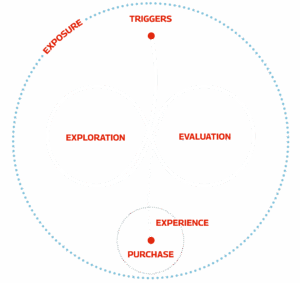There’s nothing worse than when you need just a simple answer, and no matter how hard you search, you can’t find it. The internet has made it so easy for businesses and consumers to connect, share information and most importantly, make online transactions. However, the buying journey isn’t linear, it’s messy. Consumers go from platform to platform searching for answers to help inform their decisions and ultimately the brands they engage with and make a purchase from.
If businesses aren’t providing the answers consumers are looking for, then they’re losing out. Not only are they losing out on sales, but also money as customers become frustrated, leading to shopping abandonment and high support costs to solve problems. This is why having an FAQ (Frequently Asked Questions) section on your website can solve a lot of these issues, and despite the importance of this section, it’s often an overlooked solution.
In this blog we’ll look at the data behind an FAQ section or page, asses the pros and cons of your website having this feature, and some top tips for creating compelling content to generate ROI. Read on to discover the data-driven reasons why FAQs and answering questions should be an essential part of your content marketing strategy.
The Stats and benefits of FAQs
There are many reasons why FAQs can and, in my opinion, should be part of your content marketing strategy. However, let’s not just take my word for it; let’s look at some of the data that shows how powerful they can be.
Enhancing SEO, website visibility and conversions
One of the biggest reasons why FAQs and answering questions should be part of your organic strategy is that they can support the SEO of your website and increase its online visibility. Here are some stats that show why:
- According to Clearscope, a ‘People also ask’ section appears with the Google Search results for about 40-70% of queries.” Meaning that by structuring your content as questions and answers, and providing high-quality, relevant information, you’re more likely to show in this section.
- 65% of consumers feel more positive about a brand after discovering and reading educational content (source).
- Q&A content can help target long-tail keywords, which have been found to drive 36% of conversions (source).
- 31% of B2B marketers are increasing their content focus on user intent and answering questions in order to keep up with AI advances in SEO (source).
- 83% of consumers make a company website the first point of contact to find out information (source). Meaning if you’re not answering their questions, you’re missing out.
- 61% of consumers will leave a website if they can’t find the information they’re looking for (source).
Improving customer experience
As well as enhancing SEO and driving conversions, FAQs and question-based content can also improve a customer’s experience, boost support efficiency and save time and money for businesses. Think about the sheer volume of routine questions your customer service team receives daily. Each one takes time, resources and often results in the same response. By empowering customers to find the answers themselves through a well-planned and structured FAQ section, you can dramatically reduce the burden on your support staff and improve customer satisfaction.
- Research by HubSpot found that 90% of customers rate an ‘immediate’ response as essential or very important when they have a customer service question (source).
- 51% of consumers prefer self-service help options, like FAQ pages (source).
- Zendesk found that 69% of consumers try to resolve their issues independently before contacting customer support (source)
- 28% of consumers get frustrated when the information they are looking for is simple but hard to find (source).
- 70% of customers would rather use a company’s website to get answers than talk to a human (source).
- 84% of businesses that provide a positive customer experience have reported increases in revenue and profits (source).
Beyond the Numbers: The Intangible Benefits
So we’ve been through the numbers and seen how powerful FAQs can be, but what about the intangible benefits? It might not always be possible to track the source of a conversion to FAQs, but that doesn’t mean the content isn’t playing a vital role in your growth strategy. Let’s take a look at some additional benefits of FAQs.

Customer education
As mentioned, the buying journey is messy, and Google coined the term ‘The Messy Middle’, which describes how consumers go between exploration and evaluation, looking for answers to inform their decision before making a purchase. This is why having an FAQ section or ensuring you’re regularly answering questions with informational content can be beneficial for educating your customers.
Answering questions gives brands a chance to showcase their knowledge and demonstrate their authority within the marketplace. By providing useful information about a specialist topic, a brand can also demonstrate E-E-A-T (Expertise, Experience, Authority and Trust) signals to Google, which then shows to the search engine that they are a reputable source to showcase high in the rankings.
Feedback loop
FAQ sections can help provide a better customer experience for your business and its clients, it’s also a great way to understand your customers more and gain feedback. They can also be a great way to save brands and their team time, by not having to repeat the same answers to multiple users, instead directing the audience to a source of all their information needs.
Consistency
Regularly answering questions and having a dedicated space for them on a website can enable a brand to show consistency to its audience. This can not only be in the format they are using to answer questions, but also in the content of what they are actually saying. Brands can align their content with their values and provide efficient customer service that enhances their customer experience.
Best practices for your FAQs
So you’ve decided to create an FAQ page or section, but how can you ensure that it’s in the best possible shape to drive the return you’re looking for? Here are a few points to help:
- Keep it updated: regularly review the existing content and add new questions. To help find these questions, use tools like ‘Answer the Public’ and ‘Google Trends’ to find out what users are searching for and what they need answering. We suggest regularly reviewing this content at least once a quarter if not biannually to keep it fresh and relevant.
- Make it user-friendly: the page or your section needs to be easy to navigate and provide users with functionality that helps them quickly find the answers they are looking for. For example, the section having a search bar or being categorised into clear and relevant groups
- Provide clear and concise information: Your answers should avoid jargon and leave consumers with fewer questions.
- Link strategically: Within your answers, you can direct users to other pages, resources or contact forms to generate more engagement with consumers.
- Put yourself in the consumer’s shoes: Thinking like the customer and about what they really want to know can help you create a really useful and engaging page or section.
- Stay true to your brand: As with any of your content, you should ensure that it is true to your brand and in keeping with your tone of voice. This will help keep the information unique to you and your brand and ensure consistency across your website.
- Use the FAQ schema: including the relevant schema will help you show higher up in the SERP, and gain more traffic and engagement.

Are FAQ pages/sections outdated?
With the advances and changes to digital marketing and, in particular, organic strategy, it is a reasonable question to ask. Whilst a full dedicated FAQ page or section might seem traditional and not be in-keeping with your brand or website structure, content that answers users’ questions is more vital than ever and should definitely be part of your strategy.
Structuring content as questions and answers allows users and search engines to better understand your content and find the specific information they desire. Therefore, meaning your brand is more likely to show in search results and be discovered by consumers.
However, instead of being confined to a single page, the essence of FAQs is evolving into ‘answer-first content’. This means including direct answers within product pages, service descriptions or even dedicated blog posts that address customer queries. Examples of this can be shown above and below.

Many businesses are also leveraging AI-powered chatbots, which draw from an FAQ knowledge base to provide instant and conversational responses that ensure customers receive the information they need in real-time, whilst also not having to navigate from the page they are on.
Remember, when it comes to a high-performing content marketing strategy, a mixture of content that varies in length, structure, and formats is more likely to provide better results than one form of content which is just replicated. The overall goal is to provide the user with the answer they need in the quickest time possible and the most convenient format.
Conclusion
In summary, FAQ sections and pages can be extremely beneficial for businesses to engage with their audience more and generate a greater return on investment. However, with the way consumers search nowadays, across other platforms, through voice and with AI, it’s important that businesses don’t just focus on written website pages that answer questions.
Instead, businesses should look to answer questions in multiple formats and across multiple platforms. For example, using live and short-form videos on social media. By doing this and having a multi-channel content strategy, businesses can ensure they are ‘showing up’ wherever consumers are searching, and being there to provide the answers they need at the right time.
So don’t wait around, start building your FAQ sections, answering questions and providing your audience with valuable information that demonstrates strong E-E-A-T signals. Need help getting started? Contact our team for a bespoke analysis and strategy review.













